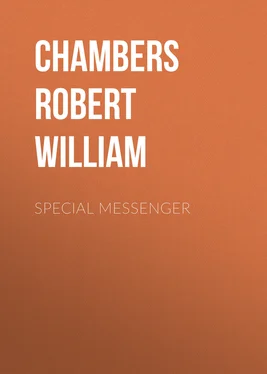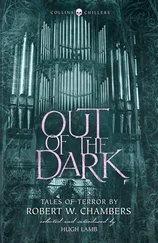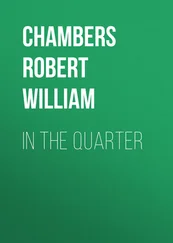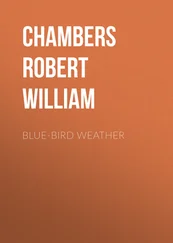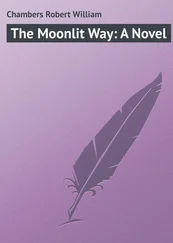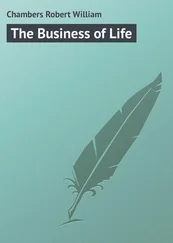Robert Chambers - Special Messenger
Здесь есть возможность читать онлайн «Robert Chambers - Special Messenger» — ознакомительный отрывок электронной книги совершенно бесплатно, а после прочтения отрывка купить полную версию. В некоторых случаях можно слушать аудио, скачать через торрент в формате fb2 и присутствует краткое содержание. Жанр: Альтернативная история, foreign_antique, foreign_prose, foreign_children, Исторические приключения, на английском языке. Описание произведения, (предисловие) а так же отзывы посетителей доступны на портале библиотеки ЛибКат.
- Название:Special Messenger
- Автор:
- Жанр:
- Год:неизвестен
- ISBN:нет данных
- Рейтинг книги:3 / 5. Голосов: 1
-
Избранное:Добавить в избранное
- Отзывы:
-
Ваша оценка:
- 60
- 1
- 2
- 3
- 4
- 5
Special Messenger: краткое содержание, описание и аннотация
Предлагаем к чтению аннотацию, описание, краткое содержание или предисловие (зависит от того, что написал сам автор книги «Special Messenger»). Если вы не нашли необходимую информацию о книге — напишите в комментариях, мы постараемся отыскать её.
Special Messenger — читать онлайн ознакомительный отрывок
Ниже представлен текст книги, разбитый по страницам. Система сохранения места последней прочитанной страницы, позволяет с удобством читать онлайн бесплатно книгу «Special Messenger», без необходимости каждый раз заново искать на чём Вы остановились. Поставьте закладку, и сможете в любой момент перейти на страницу, на которой закончили чтение.
Интервал:
Закладка:
Robert W. Chambers
Special Messenger
Thou hast given a banner to them that fear Thee, that it may be displayed because of the truth.
—Psalm lx, 4.PREFACE
In the personality and exploits of the “Special Messenger,” the author has been assured that a celebrated historical character is recognizable—Miss Boyd, the famous Confederate scout and spy.
It is not uncommon that the readers of a book know more about that book than the author.
R. W. C.PART ONE
WHAT SHE WAS
I
NONCOMBATANTS
About five o’clock that evening a Rhode Island battery clanked through the village and parked six dusty guns in a pasture occupied by some astonished cows.
A little later the cavalry arrived, riding slowly up the tree-shaded street, escorted by every darky and every dog in the country-side.
The clothing of this regiment was a little out of the ordinary. Instead of the usual campaign head gear the troopers wore forage caps strapped under their chins, heavy visors turned down, and their officers were conspicuous in fur-trimmed hussar tunics slung from the shoulders of dark-blue shell jackets; but most unusual and most interesting of all, a mounted cavalry band rode ahead, led by a bandmaster who sat his horse like a colonel of regulars—a slim young man with considerable yellow and gold on his faded blue sleeves, and an easy manner of swinging forward his heavy cut-and-thrust sabre as he guided the column through the metropolitan labyrinths of Sandy River.
Sandy River had seen and scowled at Yankee cavalry before, but never before had the inhabitants had an opportunity to ignore a mounted band and bandmaster. There was, of course, no cheering; a handkerchief fluttered from a gallery here and there, but Sandy River was loyal only in spots, and the cavalry pressed past groups of silent people, encountering the averted heads or scornful eyes of young girls and the cold hatred in the faces of gray-haired gentlewomen, who turned their backs as the ragged guidons bobbed past and the village street rang with the clink-clank of scabbards and rattle of Spencer carbines.
But there was a small boy on a pony who sat entranced as the weather-ravaged squadrons trampled by. Cap in hand, straight in his saddle, he saluted the passing flag; a sunburnt trooper called out: “That’s right, son! Bully for you!”
The boy turned his pony and raced along the column under a running fire of approving chaff from the men, until he came abreast of the bandmaster once more, at whom he stared with fascinated and uncloyed satisfaction.
Into a broad common wheeled the cavalry; the boy followed on his pony, guiding the little beast in among the mounted men, edging as close as possible to the bandmaster, who had drawn bridle and wheeled his showy horse abreast of a group of officers. When the boy had crowded up as close as possible to the bandmaster he sat in silence, blissfully drinking in the splendors of that warrior’s dusty apparel.
“I’m right glad you-all have come,” ventured the boy.
The bandmaster swung round in his saddle and saw a small sun-tanned face and two wide eyes intently fixed on his.
“I reckon you don’t know how glad my sister and I are to see you down here,” said the boy politely. “When are you going to have a battle?”
“A battle!” repeated the bandmaster.
“Yes, sir. You’re going to fight, of course, aren’t you?”
“Not if people leave us alone—and leave that railroad alone,” replied the officer, backing his restive horse to the side of the fence as the troopers trotted past into the meadow, fours crowding closely on fours.
“Not fight?” exclaimed the boy, astonished. “Isn’t there going to be a battle?”
“I’ll let you know when there’s going to be one,” said the bandmaster absently.
“You won’t forget, will you?” inquired the boy. “My name is William Stuart Westcote, and I live in that house.” He pointed with his riding whip up the hill. “You won’t forget, will you?”
“No, child, I won’t forget.”
“My sister Celia calls me Billy; perhaps you had better just ask her for Billy if I’m not there when you gallop up to tell me—that is, if you’re coming yourself. Are you?” he ended wistfully.
“Do you want me to come?” inquired the bandmaster, amused.
“Would you really come?” cried the boy. “Would you really come to visit me?”
“I’ll consider it,” said the bandmaster gravely.
“Do you think you could come to-night?” asked the boy. “We’d certainly be glad to see you—my sister and I. Folks around here like the Malletts and the Colvins and the Garnetts don’t visit us any more, and it’s lonesome sometimes.”
“I think that you should ask your sister first,” suggested the bandmaster.
“Why? She’s loyal!” exclaimed the boy earnestly. “Besides, you’re coming to visit me , I reckon. Aren’t you?”
“Certainly,” said the bandmaster hastily.
“To-night?”
“I’ll do my best, Billy.”
The boy held out a shy hand; the officer bent from his saddle and took it in his soiled buckskin gauntlet.
“Good night, my son,” he said, without a smile, and rode off into the meadow among a crowd of troopers escorting the regimental wagons.
A few moments later a child on a pony tore into the weed-grown drive leading to the great mansion on the hill, scaring a lone darky who had been dawdling among the roses.
“’Clar’ tu goodness, Mars Will’m, I done tuk you foh de Black Hoss Cav’ly!” said the ancient negro reproachfully. “Hi! Hi! Wha’ foh you mek all dat fuss an’ a-gwine-on?”
“Oh, Mose!” cried the boy, “I’ve seen the Yankee cavalry, and they have a horse band, and I rode with them, and I asked a general when they were going to have a battle, and the general said he’d let me know!”
“Gin’ral?” demanded the old darky suspiciously; “who dat gin’ral dat gwine tell you ’bout de battle? Was he drivin’ de six-mule team, or was he dess a-totin’ a sack o’ co’n? Kin you splain dat, Mars Will’m?”
“Don’t you think I know a general when I see one?” exclaimed the boy scornfully. “He had yellow and gilt on his sleeves, and he carried a sabre, and he rode first of all. And—oh, Mose! He’s coming here to pay me a visit! Perhaps he’ll come to-night; he said he would if he could.”
“Dat gin’ral ’low he gwine come here?” muttered the darky. “Spec’ you better see Miss Celia ’fo’ you ax dis here gin’ral.”
“I’m going to ask her now,” said the boy. “She certainly will be glad to see one of our own men. Who cares if all the niggers have run off? We’re not ashamed—and, anyhow, you’re here to bring in the decanters for the general.”
“Shoo, honey, you might talk dat-a-way ef yo’ pa wuz in de house,” grumbled the old man. “Ef hit’s done fix, nobody kin onfix it. But dess yo’ leave dem gin’rals whar dey is nex’ time, Mars Will’m. Hit wuz a gin’ral dat done tuk de Dominiker hen las’ time de blueco’ts come to San’ River.”
The boy, sitting entranced in reverie, scarcely heard him; and it was only when a far trumpet blew from the camp in the valley that he started in his saddle and raised his rapt eyes to the windows. Somebody had hung out a Union flag over the jasmine-covered portico.
“There it is! There it is, Mose!” he cried excitedly, scrambling from his saddle. “Here—take the bridle! And the very minute you hear the general dashing into the drive, let me know!”
Читать дальшеИнтервал:
Закладка:
Похожие книги на «Special Messenger»
Представляем Вашему вниманию похожие книги на «Special Messenger» списком для выбора. Мы отобрали схожую по названию и смыслу литературу в надежде предоставить читателям больше вариантов отыскать новые, интересные, ещё непрочитанные произведения.
Обсуждение, отзывы о книге «Special Messenger» и просто собственные мнения читателей. Оставьте ваши комментарии, напишите, что Вы думаете о произведении, его смысле или главных героях. Укажите что конкретно понравилось, а что нет, и почему Вы так считаете.
